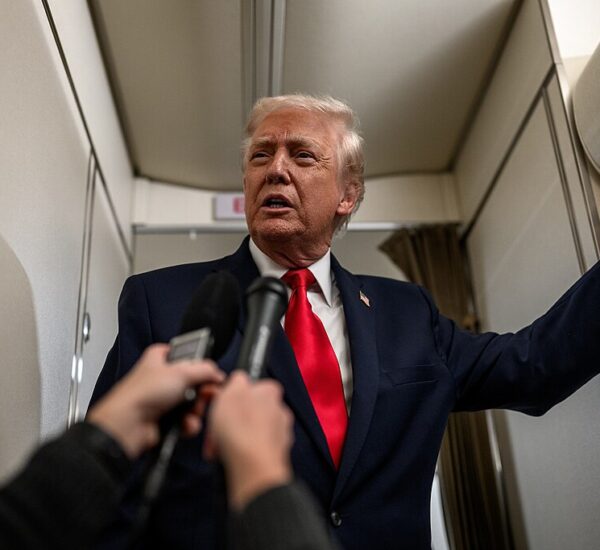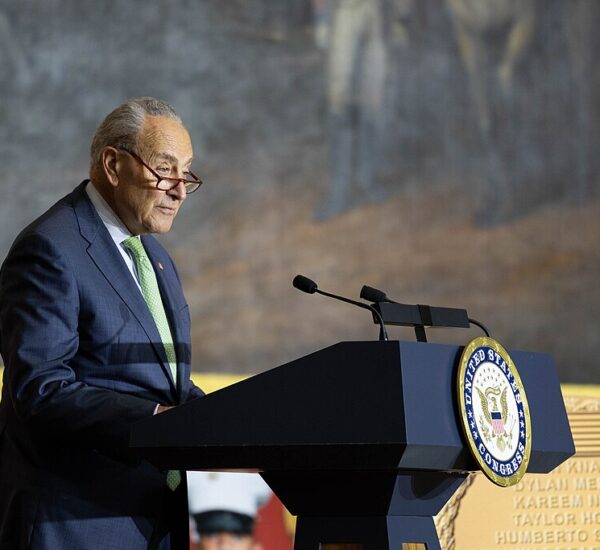Dems Panic After Major Trump Win
On Wednesday, the House of Representatives elected Rep. Mike Johnson from Louisiana as its 56th Speaker, concluding a tumultuous three-week period that had brought the lower chamber to a standstill in a remarkable fashion.
According to The Hill, after much uncertainty, House Republicans have now united behind their new leader, Rep. Mike Johnson, hoping that he can guide them through a series of legislative and political challenges in the coming weeks and months. This task won’t be easy, given the divisions within the GOP.
Rep. Mike Johnson, who previously served as the vice chair of the House Republican Conference during his second term, secured the position of Speaker in a 220-209 vote against Minority Leader Hakeem Jeffries from New York. This victory officially marked his succession to former Speaker Kevin McCarthy from California, who was removed earlier in the month.
Johnson’s election received unanimous support from Republicans on the House floor.
The rise of Rep. Johnson to the position of Speaker marks the end of a contentious and turbulent period for the House GOP conference. During this time, McCarthy was removed from his position, and the conference went through four different Speaker nominees before ultimately selecting Johnson as their new leader.
Speaking at a news conference on the steps of the House following his swearing-in as Speaker, Johnson stated, “We’re in the majority right now. We’ve gone through a little bit of character building, and you know what it’s produced, more strength, more perseverance, and a lot of hope.”
“And that’s what we’re about to deliver to the American people,” he added.
While the recent turmoil has come to an end, challenges lie ahead for the House. Congress faces a November 17 deadline to fund the government to avoid a shutdown. Additionally, the White House is seeking approval for a $100 billion national security supplemental to support Israel and Ukraine in their respective conflicts. These legislative efforts will be early tests of Johnson’s ability to manage the sometimes unruly GOP conference, a challenge that McCarthy grappled with during his nine-month tenure.
If the first part of the 118th Congress and the recent weeks are any indication, Johnson has his work cut out for him.
McCarthy’s removal was partially due to his push for a “clean” stopgap funding proposal to keep the government funded until November 17 and avoid an omnibus package, which many Republicans opposed. Johnson has suggested extending the stopgap measure into the next year to bypass an omnibus package, a move that has received some support from hard-line members who are willing to give him a chance.
“We had a trust factor with leadership last time,” explained House Freedom Caucus Chairman Scott Perry from Pennsylvania. “You don’t blame the backup quarterback for the failures of the guy that just came out of the game.”
Rep. Johnson expressed his readiness to tackle the numerous challenges ahead. Shortly after becoming Speaker, the House considered a bipartisan resolution supporting Israel, which had been delayed due to the Speaker stalemate. Johnson reassured the nation’s allies and adversaries around the world that Congress is back on track.
“The last thing I’m going to say is a message to the rest of the world,” Johnson declared in the House chamber. “They have been watching this drama play out for a few weeks; we’ve learned a lot of lessons, but you know what? Through adversity, it makes you stronger.”
“And we want our allies around the world to know that this body of lawmakers is reporting again to our duty stations,” he continued. “Let the enemies of freedom around the world hear us loud and clear: The People’s House is back in business.”
Johnson was officially sworn in as Speaker by Rep. Harold Rogers from Kentucky, the dean of the House, on Wednesday afternoon. Johnson noted that his wife, Kelly, was unable to attend the swearing-in ceremony due to the sudden nature of his rise to the Speakership.
While Johnson’s ascent was swift, the process leading to his election was protracted. Personal conflicts, intense political maneuvering, ethical concerns, and even former President Trump’s influence had left House Republicans in a state of internal turmoil for three weeks following McCarthy’s abrupt removal.
Many hard-liners viewed House Majority Leader Steve Scalise as too establishment, and concerns over his health due to a blood cancer diagnosis made some hesitant to support him. Jim Jordan, a prominent candidate, received the endorsement of Scalise only after winning the nomination, and there was uncertainty about his chances. Scalise withdrew from the race the following day.
The conference then considered Tom Emmer, the House Majority Whip, as a potential Speaker. However, criticism over his votes against overturning the 2020 election results and in favor of same-sex marriage, along with opposition from Trump, led to his withdrawal just four hours later.
Ultimately, Johnson, known for his conservative voting record and reputation as a friendly figure with no major adversaries, emerged as the consensus choice after the GOP had explored various options.
“A man of deep faith, Mike epitomizes what it means to be a servant leader,” remarked House GOP Chairwoman Elise Stefanik from New York during her speech nominating Johnson for Speaker. “A friend to all, an enemy to none, Mike is strong, tough, and fair — and above all, Mike is kind.”
Even a last-minute effort by McCarthy’s allies to reinstall him as Speaker amid the chaos couldn’t change the conference’s momentum in rallying behind Johnson.
The 51-year-old Johnson has served as the House GOP’s vice chair since 2021, a junior leadership position. He previously chaired the Republican Study Committee, the largest conservative caucus in the House, and is currently a member of the House Judiciary and Armed Services committees.
Before his time in Congress, Johnson served in the Louisiana State House and worked as a constitutional law attorney. He also had experience as a talk show host and a college professor. Johnson’s wife, Kelly, is a licensed Christian counselor, and they have four children.
Throughout his congressional career, the low-profile Louisiana Republican primarily focused on his work with the House Judiciary Committee and the House Armed Services Committee.
In 2020, Johnson played a prominent role in former President Trump’s efforts to challenge the results of the presidential election. He led an amicus brief supporting a Texas lawsuit seeking to overturn the election outcomes in several states. When asked about his stance on the 2020 election, Johnson avoided the question, and GOP lawmakers around him expressed their disapproval of the inquiry.
Democrats have highlighted Johnson’s involvement in the 2020 election challenge and have criticized his positions on Social Security and Medicare.
During the Speaker selection process, Republicans primarily directed their criticism at the eight Republicans who voted to remove McCarthy, a move that set the chain of events in motion. They called for repercussions for these members and publicly criticized them.
This group, led by Rep. Matt Gaetz from Florida, joined with Democrats to oust McCarthy from his position on October 3, marking the first successful removal of a sitting Speaker in House history. Despite the controversy and heightened tensions, the members of the “crazy eight,” as McCarthy referred to them, expressed no regrets.
“It was worth it,” stated Gaetz on Tuesday night. “I promised the American people that we would improve and upgrade the position of Speaker of the House. And when we elect Mike Johnson, I will have delivered on that commitment.”






